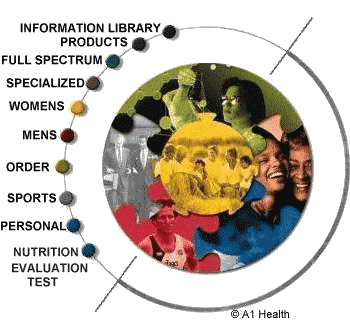The FDA does not approve or disapprove of any dietary
supplement. FDA is only concerned with products that contain ingredients that
are not recognized as safe. Our products contain only those ingredients that
appear on the Governments list of generally recognized as safe.
The Food and Drug Administration touches the lives of virtually every food
we eat is safe and wholesome, the cosmetics we use won't hurt us, the medicinesand
medical devices we use are safe and effective, and that radiation-emitting products
such as microwave ovens won't do us harm. Feed and drugs for pets and farm animals
also come under FDA scrutiny. FDA also ensures that all of these products are
labeled truthfully with the information that people need to use them properly
FDA is one of our nation's oldest consumer protection agencies. Its approximately
9,000 employees monitor the manufacture, import, transport, storage and sale
of about $1 trillion worth of products each year. It does that at a cost to
the taxpayer of about $3 per person.
First and foremost, FDA is a public health agency, charged with protecting
American consumers by enforcing the Federal Food, Drug, and Cosmetic Act and
several related public health laws. To carry out this mandate of consumer protection,
FDA has some 1,100 investigators and inspectors who cover the country's almost
95,000 FDA-regulated businesses. These employees are located in district and
local offices in 157 cities across the country.
These investigators and inspectors visit more than 15,000 facilities a year,
seeing that products are made right and labeled truthfully. As part of their
inspections, they collect about 80,000 domestic and imported product samples
for examination by FDA scientists or for label checks.If a company is found
violating any of the laws that FDA enforces, FDA can encourage the firm to
voluntarily correct the problem or to recall a faulty product from the market.
A recall is generally the fastest and most effective way to protect the public
from an unsafe product.
When a company can't or won't correct a public health problem with one
of its products voluntarily, FDA has legal sanctions it can bring to bear.
The agency can go to court to force a company to stop selling a product and
to have items already produced seized and destroyed. When warranted, criminal
penalties--including prison sentences--are sought against manufacturers and
distributors.
About 3,000 products a year are found to be unfit for consumers and are
withdrawn from the marketplace, either by voluntary recall or by court-ordered
seizure. In addition, about 30,000 import shipments a year are detained at
the port of entry because the goods appear to be unacceptable.
Scientific Expertise
The scientific evidence needed to back up FDA's legal cases is prepared
by the agency's 2,100 scientists, including 900 chemists and 300 microbiologists,
who work in 40 laboratories in the Washington, D.C., area and around the country.
Some of these scientists analyze samples to see, for example, if products
are contaminated with illegal substances. Other scientists review test results
submitted by companies seeking agency approval for drugs, vaccines, food additives,
coloring agents and medical devices.
FDA also operates the National Center for Toxicological Research at Jefferson,
Arkansas, which investigates the biological effects of widely used chemicals.
The agency also runs the Engineering and Analytical Center at Winchester,
Massachusetts, which tests medical devices, radiation-emitting products, and
radioactive drugs.
Assessing risks--and, for drugs and medical devices, weighing risks against
benefits--is at the core of FDA's public health protection duties. By ensuring
that products and producers meet certain standards, FDA protects consumers
and enables them to know what they're buying. For example, the agency requires
that drugs--both prescription and over-the-counter--be proven safe and effective.
In deciding whether to approve new drugs, FDA does not itself do research,
but rather examines the results of studies done by the manufacturer. The agency
must determine that the new drug produces the benefits it's supposed to without
causing side effects that would outweigh those benefits.
Product Safety
Another major FDA mission is to protect the safety and wholesomeness of
food. The agency's scientists test samples to see if any substances, such
as pesticide residues, are present in unacceptable amounts. If contaminants
are identified, FDA takes corrective action. FDA also sets labeling standards
to help consumers know what is in the foods they buy.
The nation's food supply is protected in yet another way as FDA sees that
medicated feeds and other drugs given to animals raised for food are not threatening
to the consumer's health.
The safety of the nation's blood supply is another FDA responsibility.
The agency's investigators routinely examine blood bank operations, from record-keeping
to testing for contaminants. FDA also ensures the purity and effectiveness
of biological s (medical preparations made from living organisms and their
products), such as insulin and vaccines.
Medical devices are classified and regulated according to their degree
of risk to the public. Devices that are life-supporting, life-sustaining or
implanted, such as pacemakers, must receive agency approval before they can
be marketed.
FDA's scrutiny does not end when a drug or device is approved for marketing;
the agency collects and analyzes tens of thousands of reports each year on
drugs and devices after they have been put on the market to monitor for any
unexpected adverse reactions.
Cosmetic safety also comes under FDA's jurisdiction. The agency can have
unsafe cosmetics removed from the market. The dyes and other additives used
in drugs, foods and cosmetics also are subject to FDA scrutiny. The agency
must review and approve these chemicals before they can be used.
 LIBRARY
LIBRARY
Are there
any people who should not take your products?
 REQUEST YOUR FREE EAGLE PRODUCT INFORMATION
PACK: INFOPACK@eagle-min.com
REQUEST YOUR FREE EAGLE PRODUCT INFORMATION
PACK: INFOPACK@eagle-min.com

INDEPENDENT
SupraLife Distributor
For personal service Call:
A1 Health
TOLL FREE ORDER EXPRESS HOT LINE :888-441-4184
9 AM Till 7PM EST
 e-mail: info@colloidal-min.com
e-mail: info@colloidal-min.com
